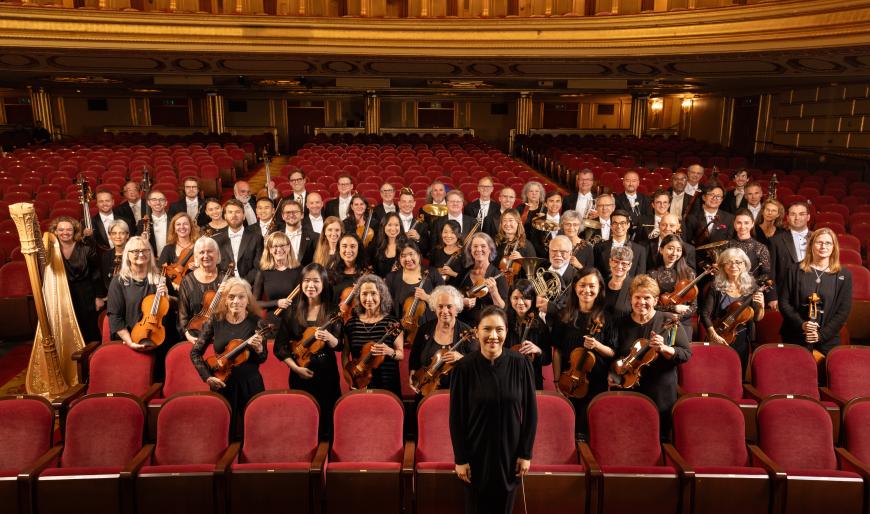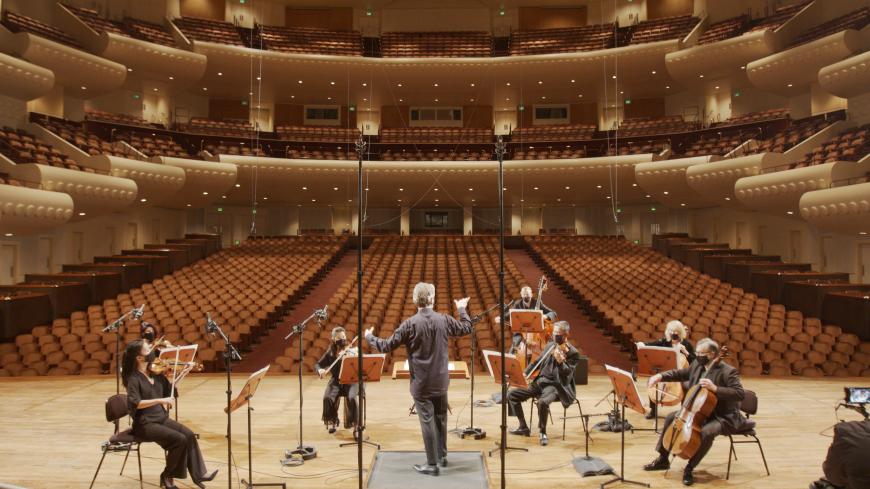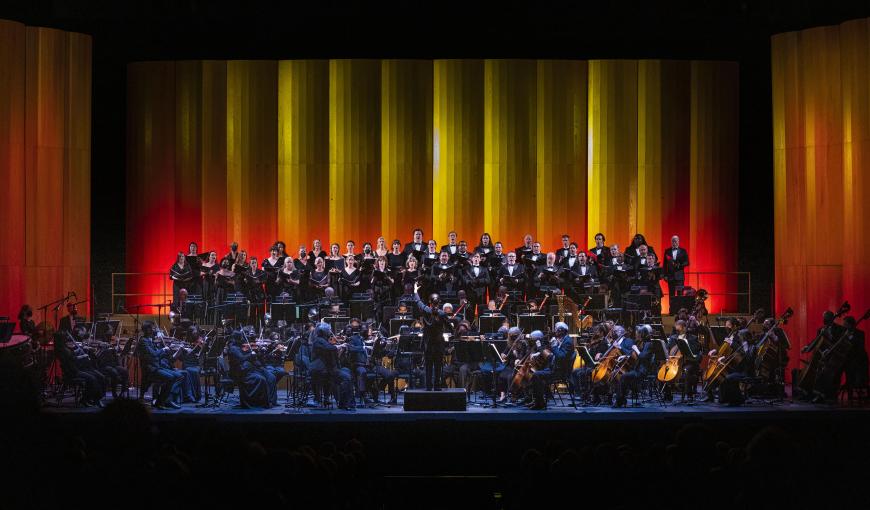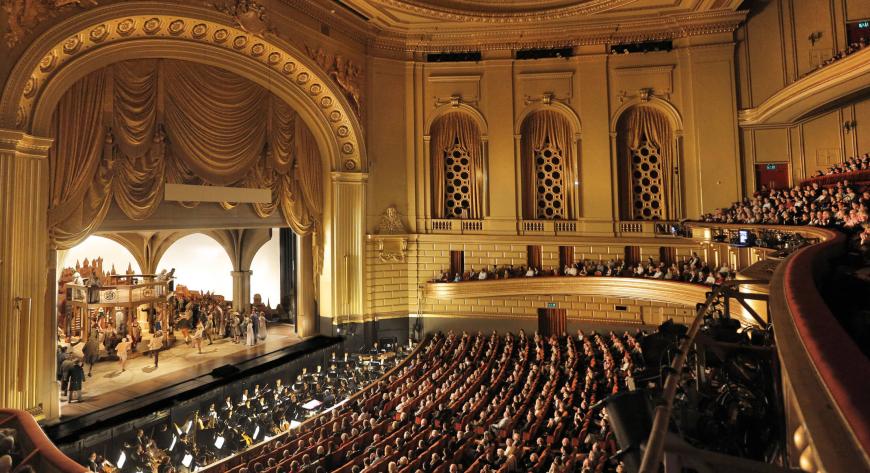
On Sept. 5, the night before San Francisco Opera opened its 102nd season, the SF Opera Orchestra distributed a statement about contract negotiations, saying that its members have been “operating without a contract since July 31, despite musicians’ best efforts.”
The statement continued, “We love the Opera and our patrons, and we are excited about our season, but our current situation of working without a contract is untenable.”
SF Opera administration responded the next day (see below), but then there came an unexpected development backstage at the War Memorial Opera House that same evening, just before the opening-night performance of Verdi’s Un ballo in maschera.
The musicians refused to take their place in the orchestra pit and perform unless receiving immediate action on their contract. A statement from the SF Opera Orchestra described what happened during the brief standoff:
“In the moments leading up to the performance, the Orchestra reached an agreement with management for a short-term contract extension through the month of September.
“While this is not the longer-term contract that our members deserve, the extension agreement contains the mutual aspiration of musicians and management to negotiate a multiyear contract, which they had previously refused to consider.
“This is a positive step forward, but there is still much work to be done to ensure that we can reach a multi-year agreement that provides stability and a path forward both for orchestra musicians and the organization as a whole.
“We are grateful to everyone who came out to the performance last night — and to celebrate the San Francisco Opera. We hope to be able to play for you throughout the upcoming season with a new, fair contract!”

Before the temporary settlement reached on Friday night, the SF Opera administration sent this message to SF Classical Voice, responding to the orchestra’s initial statement about the lack of a contract:
“We have incredible respect for the musicians of the San Francisco Opera Orchestra and deeply value the talents that they bring to the company and the community.
“We have been in active and regular discussions with the Orchestra for the past two months and share the Orchestra’s desire to reach a mutually agreeable resolution as soon as possible. As part of these discussions, the Opera has offered the Orchestra a one-year extension on the contract with a wage increase commensurate with that provided to staff members this season. The Opera has also indicated a willingness to negotiate an agreement greater than one year, and these discussions are in process.
“As with many arts organizations, San Francisco Opera is at an inflection point as we work to reconcile two different realities. The first reality is an incredible artistic energy in the company that has brought ticket sales back to pre-pandemic levels and which is inspiring more new people to come to the opera than ever before.
“The second reality is the impossibility of our overall financial model. Over decades, there has been a growing gap between revenues and expenses, and that model is now at a breaking point.
“We are optimistic that we will find the right solutions moving forward, but making major structural change is a complex and difficult process. We look forward to working with the Orchestra to find a sustainable path forward that recognizes both their extraordinary talents and the fiscal realities of the arts.”
For details of what is known of the money issues between management and musicians, see further below.
Across the street from the War Memorial, at the San Francisco Symphony, similar trouble is brewing, as the SF Symphony Chorus’s contract also expired on July 31, with management threatening a major reduction in wages. The orchestra’s current contract runs through Nov. 18. As of yet, there is no sign of progress in the negotiations for either contract.
In mid-July, in response to a query about the chorus’s contract, an SF Symphony spokesperson said that negotiating sessions are “ongoing” and that “out of respect for the negotiating process we won’t be providing specifics about the details of talks at this time.”

San Francisco Ballet, which sports the city’s third big orchestra, has contracts with the American Guild of Musical Artists for its dancers and with Musicians Union Local 6 for its orchestra, the latter effective through Nov. 30, 2025.
In a worst-case scenario for SF Opera and the SF Symphony, both the War Memorial and Davies Symphony Hall may go silent by early winter. Those halls were empty four years ago when COVID-19 shut down all performances. Some of the current problems with musicians’ contracts originated or worsened during the pandemic.
For SF Opera, which COVID kept out of the War Memorial without any income for 532 days between March 7, 2020, and Aug. 21, 2021, financial and organizational problems began well before then. General Director Matthew Shilvock announced the following when the company let go of key personnel while making deep budget cuts in March 2019:
“We must take the steps required to meet the challenges of our time. If we can fully align ourselves with the company’s new strategic framework, rebalance the expense budget, bring our revenue goals to a realistic level, and continue to build our endowment, an exciting creative pathway forward emerges.”
Though the SF Opera Orchestra’s contract wasn’t set to expire in 2020, some controversial and insufficient measures dictated by the pandemic were offered at that time — and accepted reluctantly. Later, the somewhat modified contract was extended by one year, expiring two months ago.

As SFCV reported back in September 2020:
“San Francisco Opera has taken the orchestra contract that was valid for two more years and revised it retroactively.”
The administration announced that “the agreement, which continues health care, guarantees a reduced but growing level of compensation over the term of the contract (50 percent this fall, growing to at least 82 percent by the final year).”
Neither the text of the contract nor any specific information was made public, but SF Classical Voice obtained specifics about the cuts to the basic minimum salary, which were set to continue through the 2022–2023 season.
The musicians, seeing no alternative in the middle of the pandemic shutdown, accepted the contract with this union announcement:
“Had we rejected these cuts — including 50 percent of our weekly salary for the [2020] fall season and deep but graduated cuts for the ensuing two years — we would immediately have been without any income or the guarantee of health coverage. The modified contract leaves key orchestra positions vacant for seven years and ties the musicians’ compensation to ticket sales. Both of these modifications are unrelated to the pandemic and outside the musicians’ control.”
Ever since the implementation of the now-expired contract, labor and management have been fighting over the terms of a “normal” contract that would make up for some of the losses during the pandemic.

What complicates the situation for management is that it cannot depend on income rising to match expenses, which makes not only agreeing to multiyear labor contracts but planning and programming for future seasons — the lifeblood of any major arts organization — difficult.
Instead of following a predictable pattern, SF Opera’s operating budget has been wildly fluctuating for some time. Shilvock places the standard budget for an eight-opera season as “in the mid $90 millions.” The company’s centennial season (2022–2023) and 101st season (2023–2024) were at that level. (The current season consists of only six productions.) But the 2020–2021 season plunged to $44 million, almost half of what the administration had counted on, before rising back to $78.5 million for the 2021–2022 season.
Through it all, former General Director David Gockley’s warning a decade ago still resounds:
“There are structural problems we face as a company and … systemic issues facing the industry as a whole — the slowly declining role of subscriptions, the difficulty of balancing budgets, the lack of bankable stars, the marginalization of the classical arts in education and the mass media, the plethora of competing entertainment forms and opportunities that compete for the time and attention of people who could be going to the opera.”




